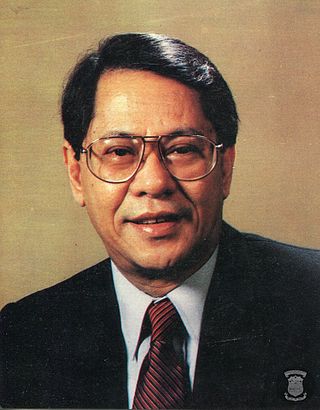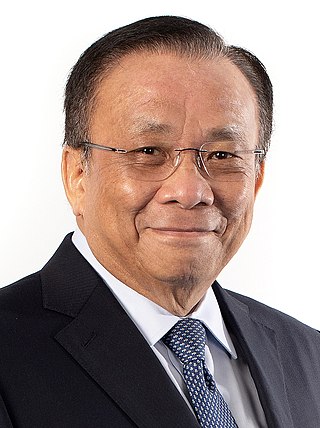
Benigno Simeon Aquino III, also known as Noynoy Aquino and colloquially as PNoy, was a Filipino politician who served as the 15th President of the Philippines from 2010 to 2016. The son of assassinated politician Benigno Aquino Jr. and 11th President of the Philippines Corazon Aquino, he was a fourth-generation politician as part of the Aquino family of Tarlac.

Edgardo Javier Angara was a Filipino lawyer and politician who served as Senate President from 1993 to 1995. Angara had the second longest tenure in the history of the Senate, serving four terms and a total of twenty-three years. As a legislator, Angara has championed numerous important laws and bills including the free high school law, the Senior Citizen discount law, and many more.

Tau Gamma Phi (ΤΓΦ), also known as Triskelions’ Grand Fraternity, is a fraternity established in the Philippines. Its members call themselves Triskelions.

The University of the East College of Law or UE Law is the law school of the University of the East, a private, non-sectarian university in Manila, Philippines.

Antonio Tirol Carpio is a former associate justice of the Supreme Court of the Philippines. He was sworn in as a member of the Supreme Court by President Gloria Macapagal Arroyo on October 26, 2001, and served until his retirement on October 26, 2019. He served as associate justice of the Supreme Court of the Philippines for a period of eighteen years. He also served as chief justice in an acting capacity several times during his tenure as Senior Associate Justice.
Legal education in the Philippines is developed and offered by Philippine law schools, supervised by the Legal Education Board. Previously, the Commission on Higher Education supervises the legal education in the Philippines but was replaced by the Legal Education Board since 1993 after the enactment of Republic Act No. 7662 or the Legal Education Reform Act of 1993.

The University of the Philippines College of Law is the law school of the University of the Philippines Diliman. Formally established in 1911 in UP Manila, it is the third oldest continually-operating law school in the Philippines. Since 1948, it has been based in UP Diliman in Quezon City, the flagship of the UP System's eight constituent universities. The college also holds extension classes at the Bonifacio Global City campus of UP Diliman in Taguig and the Iloilo City campus of UP Visayas.
The Philippine Bar Examinations is the professional licensure examination for lawyers in the Philippines. The exam is exclusively administered by the Supreme Court of the Philippines through the Supreme Court Bar Examination Committee.

Teresita Leonardo de Castro is a Filipina who served as the 24th chief justice of the Supreme Court of the Philippines; she was appointed by President Rodrigo Duterte on August 28, 2018. She assumed the vacated position once her predecessor, Maria Lourdes Sereno, was removed via a quo warranto petition ; making De Castro the de jure 24th chief justice, and the first female chief justice of the Supreme Court.
Katrina Legarda is a prominent Filipino lawyer who specializes in family law, and is an advocate of the rights of women and children.

Gilberto Eduardo Gerardo Cojuangco Teodoro Jr., nicknamed Gilbert or Gibo, is a Filipino lawyer, politician and business executive who is the incumbent Secretary of National Defense under the Marcos Jr. administration since 2023. He previously served in the same post from 2007 to 2009 under President Gloria Macapagal Arroyo. He was the nominee of Arroyo's Lakas–Kampi in the 2010 presidential election, which he lost to his second cousin, Noynoy Aquino.

Lucas “Luke” Purugganan Bersamin is a Filipino lawyer and jurist who currently serves as the 40th Executive Secretary of the Philippines. Bersamin previously served in the Supreme Court of the Philippines for 10 years, first as an associate justice from 2009 to 2018 and then as the 25th Chief Justice of the Philippines from 2018 until his retirement in 2019. He was named by President Gloria Macapagal Arroyo to the high court as an associate justice on April 2, 2009. Prior to becoming an associate justice, he was a member of the Court of Appeals.

The Alpha Phi Omega Philippines Incorporated, commonly known as Alpha Phi Omega CollegiateService Fraternity and Sorority or simply Alpha Phi Omega or APO (ΑΦΩ), is a service fraternity and sorority in the Philippines founded in 1950. It is the first established national chapter of Alpha Phi Omega outside of the United States, although both organizations have separate leaderships and operate independently. Alpha Phi Omega has 250 chapters in the Philippines and 150,000 members as of 2010.

The Silliman University College of Law is one of the constituent colleges of Silliman University, a private university in Dumaguete, Philippines. The college was founded in 1935 with Emilio Javier and Felix Gaudiel as pioneers. When the college opened, it offered a Bachelor of Laws (LLB) program, but in 2009 it shifted its offering to Juris Doctor (JD). In 2019, Silliman University College of Law was ranked by the Legal Education Board (LEB) as 8th in the list of 10 Top-Performing Law Schools in the Philippines, with 66.67% or 12 out of 18 of its first time Bar Exam Takers passing the 2018 Bar Examinations.

The 2010 Philippine Bar exam bombing occurred on Taft Avenue near De La Salle University (DLSU), located in Malate, Manila, Philippines, on September 26, 2010, at 5:05 pm PST, a few minutes after Philippine Bar examinees began exiting DLSU. A Mk2 grenade was thrown at a group of Alpha Phi Beta members from San Beda College. They were standing near Tau Gamma Phi members, who police believed were the real target of the explosive. This resulted in injuries to 47 people, including two who required amputations.

Alfredo Benjamin Sabater Caguioa is a Filipino lawyer who is an associate justice of the Supreme Court of the Philippines. Prior to his appointment as associate justice, he served as acting secretary of the Department of Justice and chief presidential legal counsel under the presidency of Benigno Aquino III.

Tranquil Gervacio S. Salvador III is a Filipino lawyer, educator, and civic leader. He has served as spokesperson and member of the defense panel for the impeachment of the then-Chief Justice Renato Corona and handled other notable cases of Filipino personalities and corporations.

Menardo Ilasco Guevarra is a Filipino lawyer serving as Solicitor General of the Philippines since 2022 under President Bongbong Marcos. He previously served as the Secretary of Justice under President Rodrigo Duterte and as a commissioner of the Philippine Competition Commission under President Benigno Aquino III. Before joining the government, he was involved in private litigation practice as a founding partner of the Medialdea Ata Bello Guevarra & Suarez law firm since 1990. He was also an active faculty member at his alma mater Ateneo de Manila University, where he graduated in 1974.
Camilo D. Quiason was a Filipino lawyer. He served as Associate Justice of the Supreme Court of the Philippines from February 1, 1993 to July 17, 1995.















